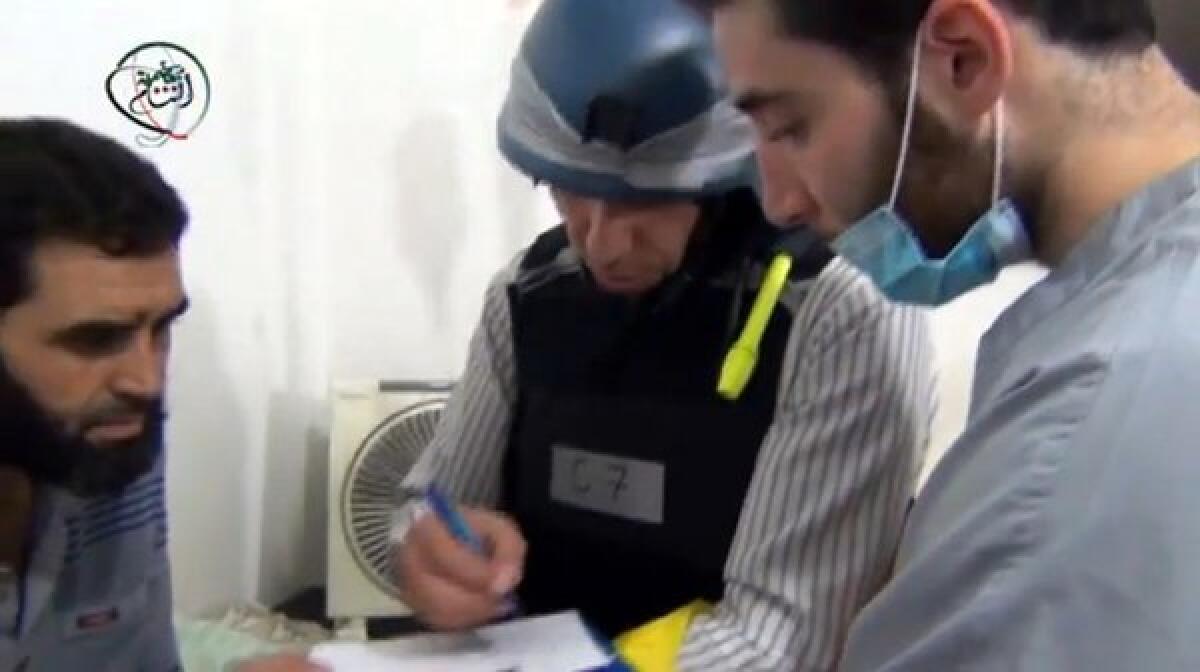U.N. inspectors reach alleged attack site after taking sniper fire

- Share via
BEIRUT — Delayed by a sniper attack, United Nations chemical weapons inspectors arrived Monday in one of the Syrian suburbs allegedly hit in a poison gas attack last week, visiting a pair of field hospitals and meeting with witnesses, the U.N. said.
The inspectors traveled to the Muadhamiya district, southwest of Damascus, after sniper volleys initially forced the U.N. convoy to turn back to the capital. A U.N. vehicle was struck in the incident, but no one was injured, the U.N. said in a statement. The damaged vehicle was replaced and the mission proceeded, the statement said.
The U.N. appears to have worked out a safe passage agreement with the two warring sides, though no specific details were released. Each side in the conflict blamed the other for the sniper fire directed at the U.N. convoy.
The U.N. planned to lodge a “strong complaint” with both the government and opposition forces about the shooting, U.N. Secretary-General Ban Ki-moon said in a statement. The inspectors, who are unarmed, will resume their work Tuesday, and Ban vowed that “the safety and security of the investigation teams will be secured.”
The team’s mandate is to ascertain whether chemical weapons were used, not to determine who used them. The rebels and the government—backed by their respective international supporters—have been trading blame for who was responsible, even as many in the West are pushing for a military response.
There was no word Monday on whether anything that the inspectors learned Monday supported or contradicted opposition allegations that a poison-gas bombardment last week killed hundreds of civilians outside Damascus.
During their visit, Ban said, the inspectors traveled to two field hospitals and interviewed witnesses, survivors and doctors, taking statements while also collecting unspecified “samples.”
Officials previously said that the team would be seeking traces of possibly contaminated soil, as well as collecting tissue, hair and other samples from victims. The samples will be taken for laboratory analysis, a process that could take weeks.
It was not clear why the team initially chose to visit Muadhamiya, where about 80 people were reported killed in last week’s suspected chemical onslaught. The hardest-hit area was apparently the so-called eastern Ghouta region, which is in the opposite direction, to the northeast of the capital.
An opposition contingent in Muadhamiya was waiting when the inspectors arrived, according to an activist in the town reached via Skype. The U.N. experts spoke with doctors and patients at a field hospital and took blood and hair samples, the activist said.
Afterward, some in the U.N. contingent went to visit a mosque that was allegedly hit during the chemical barrage last week, and another reported site of a rocket attack, according to the activist’s account.
Amateur video said to be from the inspectors’ visit showed blue-helmeted U.N. personnel, wearing flak vests, speaking with people and visiting what appeared to be a clinic, with some patients lying in beds.
ALSO:
Deadly raid could derail Israeli-Palestinian talks
Sex on the menu at newly inaugurated Swiss drive-in
Snowden’s Moscow stay an accident, Russian paper reports
Staff writers McDonnell reported from Beirut and Abdulrahim from Cairo.
More to Read
Sign up for Essential California
The most important California stories and recommendations in your inbox every morning.
You may occasionally receive promotional content from the Los Angeles Times.











